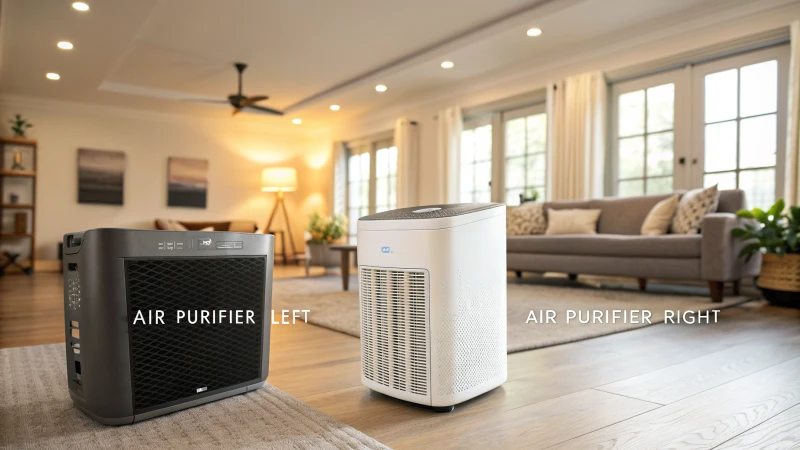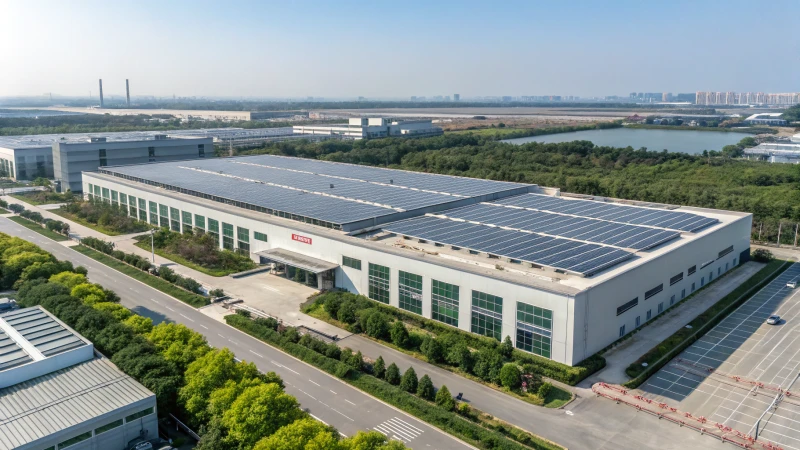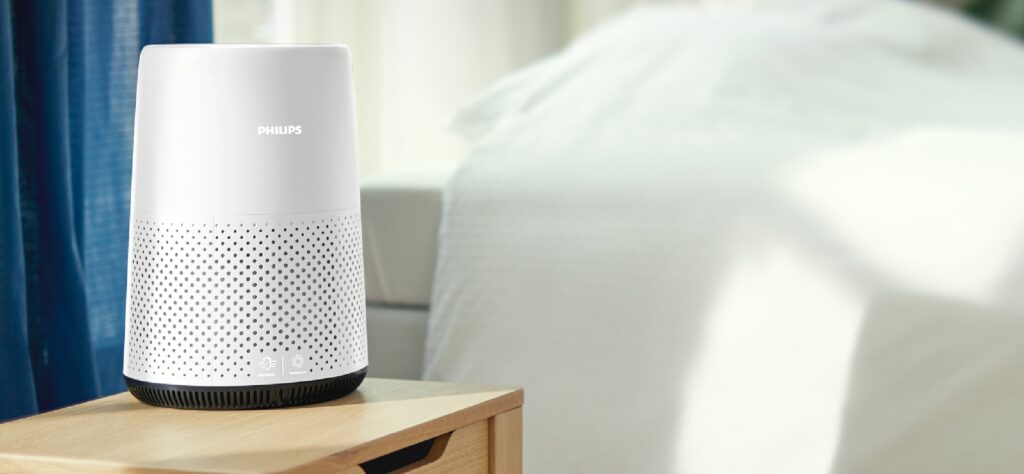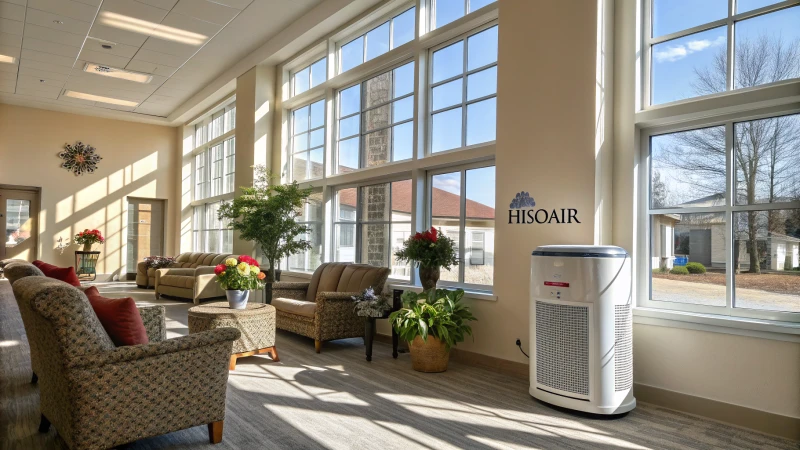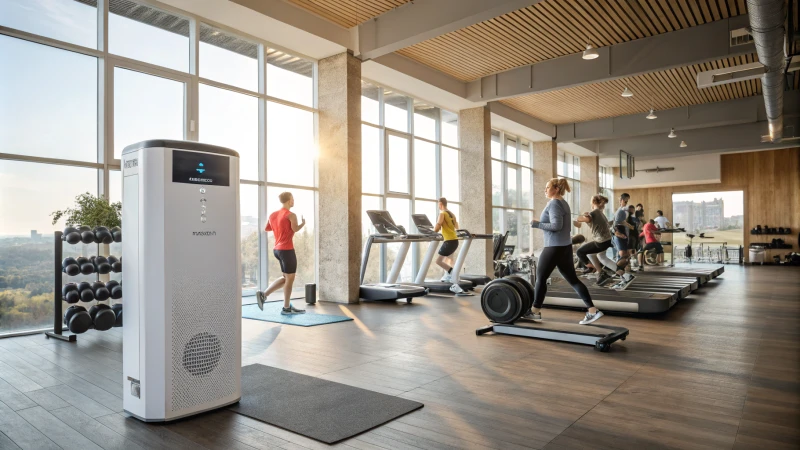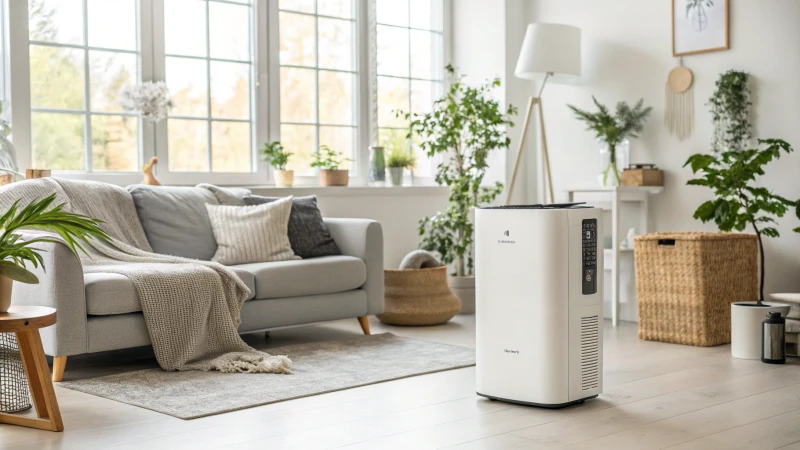Informieren Sie sich, wie Sie Hepa- und Aktivkohlefilter in Ihren Reinigungsgeräten einsetzen können, damit Sie wissen, wie Sie sie effektiv einsetzen können, ohne Schaden zu nehmen.
Hepa vs. Aktivkohle: Aktivkohlefilter ist kein HEPA-Filter
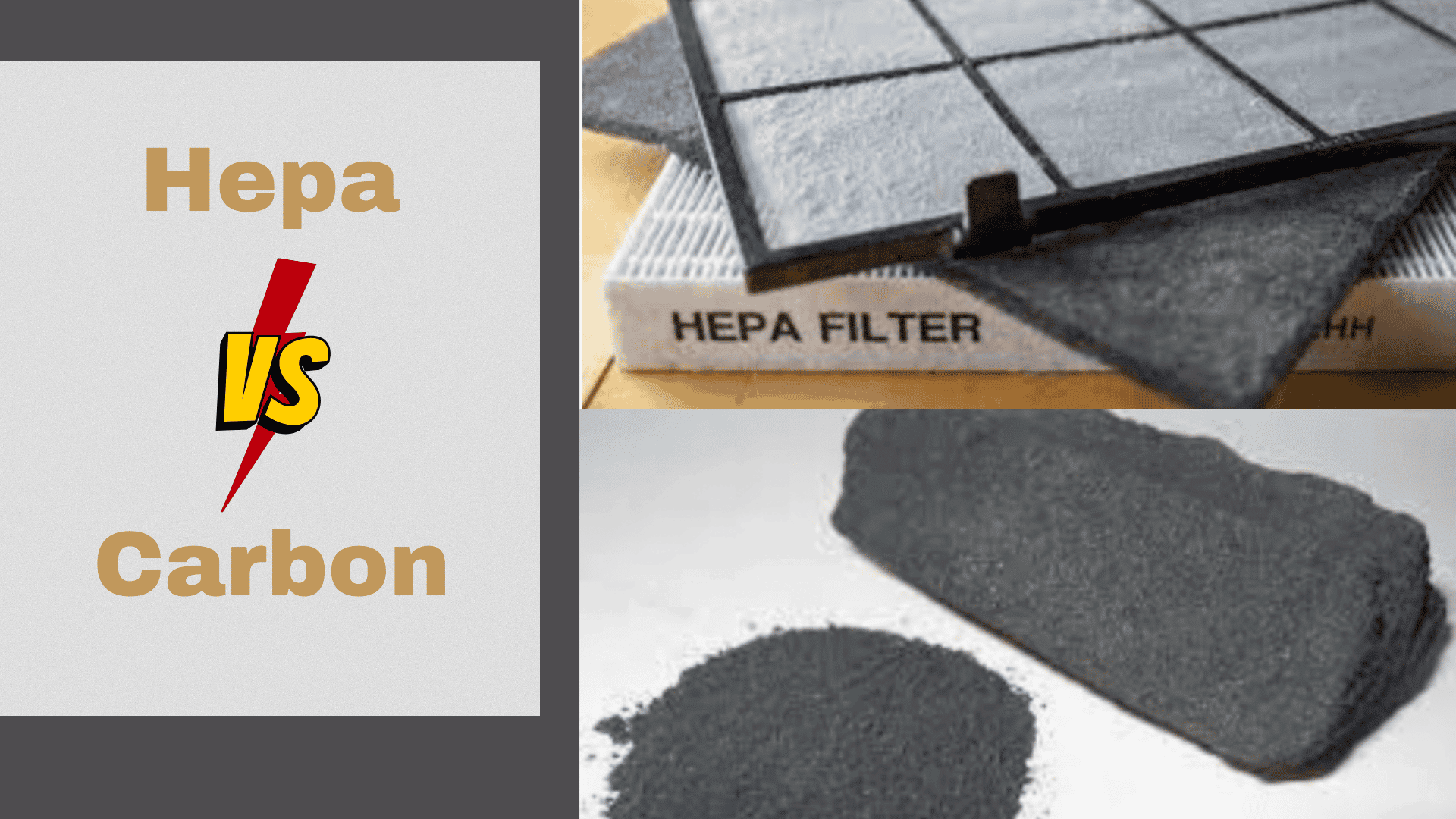
Bildquelle: © Canva
Hocheffiziente Schwebstofffilter (HEPA-Filter) können im Allgemeinen mehr als 99,5% aller in der Luft befindlichen Partikel entfernen. Pollen, Viren, Keime, Schimmel und PM2 gehören zu den Dingen, die diese Kunststoff- (PP+PET) oder Glasfaserfilter auffangen können. Aufgrund der Diffusion sind sie auch recht gut im Auffangen von Nanopartikeln.
Andererseits absorbieren Aktivkohlefilter nicht nur wie herkömmliche Filter feste Partikel, sondern auch unangenehme Gerüche und gefährliche Gase wie Ozon, Schwefeldioxid und Stickoxide.
Haben HEPA-Filter Kohlenstoff?
Trotz des Unterschieds zwischen Hepa-Filter und Kohlefilter enthalten einige HEPA-Filter auch Kohle. Allerdings werden alte Sporen, Keime, Viren, Tierhaare und Staub von HEPA-Luftfiltersystemen, die HEPA-Filter mit Materialien auf Kohlebasis kombinieren, in ihrer Entwicklung gestoppt. Außerdem werden gefährliche Gase und Aromen aus dem Haus entfernt.
Was ist eine HEPA-Aktivkohle?
Partikel, die so winzig sind wie PM 2,5, können durch die Verwendung eines HEPA-Filters abgefangen werden. Aktivkohle kann jedoch Dämpfe und Gerüche absorbieren, darunter auch flüchtige organische Verbindungen (VOC). Zu den flüchtigen organischen Verbindungen gehören auch krebserregende Stoffe wie Formaldehyd und Benzol.
Welche Funktion hat Aktivkohle in einem Luftfilter?
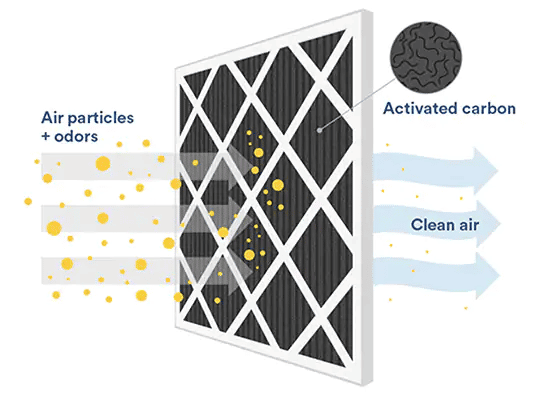
Bildquelle: © Filtrete
Aktivkohle ist aufgrund ihrer einzigartigen Eigenschaften in der Lage, schädliche Gase wie flüchtige organische Verbindungen (VOC), Gerüche und Kochdämpfe herauszufiltern. Die Art und Weise, wie sie dies tut, unterscheidet sich von HEPA- und ähnlichen Geräten, die lediglich luftgetragene Partikel herausfiltern.
Arten von Aktivkohle
- Extrudierte oder pelletierte Aktivkohlen (EAC) - Es flockt effektiv aus, entfärbt, tötet Algen und entfernt Humus.
- Granulierte Aktivkohlen (GAC) - Granulierte Aktivkohlefilter (GAC) entfernen organische Schadstoffe aus dem Wasser.
- Mit Säure gewaschene und hochreine Aktivkohlen - Um eine Auslaugung des Kondensats zu vermeiden, wird durch eine Säurewäsche lösliches Siliziumdioxid aus der Aktivkohlematrix entfernt.
- Aktivkohle in Pulverform (PAC) - PAC ist billiger und feiner als GAC. Sie ist billig genug, um sie ohne Reaktivierung oder Recycling wegzuwerfen.
Hepa-Filter vs. Kohlefilter
Wenn es um die Beseitigung von Partikeln in der Luft geht, sind HEPA-Filter unübertroffen. Bestimmte HEPA-Filter können Keime und Viren in der Luft herausfiltern. Alles, was größer als 0,03 Mikrometer ist, wird jedoch von einem typischen HEPA-Filter herausgefiltert.
Für einen effizienten Luftreiniger, der alle Arten von schlechten Gerüchen und sogar bestimmte schädliche Verbindungen beseitigen kann, ist jedoch ein großer Kohlefilter erforderlich, der in der Lage ist, große Mengen an unangenehmen Gerüchen aufzusaugen.
Hepa-Filter zur Entfernung von Partikeln
Theoretisch kann diese Art von Luftfilter 99,97% der in der Luft befindlichen Partikel bis zu einer Größe von 0,3 Mikron (m) zurückhalten, einschließlich Staub, Pollen, Schimmel, Keime und andere Allergene. Ein Durchmesser von 0,3 Mikrometern entspricht dem schlimmsten Fall, der größten Partikelgröße, die in die Haut eindringen kann (MPPS).
Ein HEPA-Luftreiniger (AP) verwendet einen mechanischen Mechanismus, bei dem die Luft durch einen HEPA-Filter geleitet wird und dabei Partikel auffängt. Die Partikel können durch einen von vier Hauptprozessen aufgefangen werden: Diffusion, Abfangen, Trägheitseinwirkung oder Sieben.
Kohlefilter zur Geruchsbeseitigung
Wenn Sie sich fragen, was ein Aktivkohlefilter bewirkt: Als erste Verteidigungslinie kann die Installation eines Aktivkohlefilters in Ihrer Heizungs-, Lüftungs- und Klimaanlage (HVAC) und/oder Ihrem Staubabscheider Gerüche erheblich reduzieren. Durch Adsorption, d. h. wenn sich Moleküle an der Außenseite einer Oberfläche anlagern, anstatt von ihr absorbiert zu werden, fangen Aktivkohlefilter Gerüche ein.
Lohnen sich Kohlefilter?
Ja, um unangenehme Gerüche, Rauch, Dämpfe und Chemikalien zu entfernen, ist die Investition in einen Kohle- oder Aktivkohlefilter eine gute Idee. So können Industrieräume mit vielen Chemikalien von Kohlefiltern profitieren. Schaumstoff, Pulver, Gewebe und feste Kohle sind nur einige der verschiedenen Formen, in denen Kohlefilter erhältlich sind.
Kurz gesagt, die Sauerstoffbehandlung von Holzkohle vergrößert die Zwischenräume zwischen ihren Kohlenstoffatomen, wodurch sie für eine Vielzahl von Anwendungen geeignet ist. Substanzen, die in den Filter gelangen, werden chemisch neutralisiert, wenn sie durch die sehr kleinen Löcher gelangen.
Vorteile der Kohlefilter
- Eine extreme Porosität kennzeichnet die Kohleblockfilter.
- Es werden nicht alle Nährstoffe entfernt, sondern das Vorhandene bleibt erhalten.
- Einfache Pflege und Reinigung sind alles, was für Kohleblockfilter erforderlich ist.
- Diese Filter sind leicht austauschbar.
- Viel billiger kann ein Filter nicht sein.
- Wiederverwendung von Wasserflaschen, indem man sie mit Wasser aus dem eigenen Wasserfilter füllt
- Kohlefilter sind tragbar
Nachteile von Kohlefiltern
Giftstoffe, die nicht von Kohlenstoff angezogen werden, können von Klimaanlagenfiltern nicht wirksam entfernt werden.
Klimaanlagenfilter verschleißen schnell und müssen gewechselt werden.
Wenn das Wasser über einen längeren Zeitraum nicht an das Kohlefiltermedium gelangt, sinkt die Filtrationsleistung.
Einige schädliche Bakterien und Viren können in Klimaanlagen überleben, und einige Filter können sogar Keime beherbergen, was zu bakteriellem Durchwuchs führt.
Ist ein Kohlefilter besser als ein HEPA-Filter?
HEPA-Filter können mehrere Aufgaben erfüllen, die Kohlefilter nicht erfüllen können. Größere physikalische Partikel wie Pollen, Hausstaubmilben, Schimmelpilzsporen und andere Allergien werden von HEPA-Filtern effektiver entfernt. Kohlefilter sind effektiver bei der Entfernung von Gerüchen, Rauch und anderen Gasen.
Hepa- vs. Kohlefilter Auto
Ein HEPA-Luftreiniger ist das wirksamste Gerät zur Entfernung von COVID-19 aus der Luft in einem Fahrzeug. Ein Partikel von der Größe von COVID-19 kann durch einen HEPA-Filter-Luftreiniger wirksam aus der Luft gefiltert werden. Dementsprechend sind hocheffiziente Partikelfilter (HEPA-Filter) die effektivste Art von Luftreiniger für den Einsatz in einem Fahrzeug.
Wenn Sie Ihre Innenraumluftfilter gegen einen HEPA-Filter austauschen, werden 99,97 Prozent aller Partikel bis zu einer Größe von 0,3 Mikrometern entfernt, was die Luftqualität in Ihrem Fahrzeug erheblich verbessert. Allerdings lassen sich mit einem HEPA-Filter allein weder flüchtige organische Verbindungen (VOC) noch Gerüche in Ihrem Fahrzeug beseitigen. Darüber hinaus entfernen und neutralisieren Aktivkohlefilter Rauch, Dämpfe und Gerüche, bevor sie in Ihr Fahrzeug gelangen können. Sie sind die einzige Art von Luftfiltern, die schädliche Gase und Chemikalien wirklich beseitigen können, so dass Sie saubere, gesunde Luft in Ihrem Auto haben.
Machen Karbonluftfilter einen Unterschied?
Kohle-Luftfilter VS traditionelle Luftfilter
Obwohl herkömmliche Glasfaser- und elektrostatische Luftfilter den Markt seit geraumer Zeit beherrschen, erfreuen sich Kohlefilter bei denjenigen, die strengere Anforderungen an ihre Luftreinigungssysteme stellen, immer größerer Beliebtheit.
Die Vorteile der Aktivkohlefiltration und ihre Fähigkeit, bestimmte Giftstoffe aus der Luft zu ziehen, sind in dem Maße bekannt geworden, wie Hausbesitzer und Kunden sich der Schadstoffe in ihren Häusern bewusster geworden sind, einschließlich derer, die für die Gesundheit schädlich sein können.
Wenn Sie planen, eine zu kaufen, können Sie nur den Kopf auf Amazon, wo ihre Preise in der Regel fällt auf 800 USD, die jam-verpackt Funktionen hat.
Sind Kohlefilter für Luftreiniger gut und wichtig?
Der HEPA-Filter fängt die kleinsten Partikel auf, während der Aktivkohlefilter größere Partikel wie Staub, Flusen, Schimmelsporen, Tierhaare und Pollen auffängt.
Aktivkohlefilter können zusätzlich zu HEPA-Filtern Gerüche und chemische Dämpfe aus einem Raum entfernen. Informieren Sie sich über Hisoair, einen Hersteller von Luftreinigern, der Ihnen hochwertige Luftreiniger anbietet
Gibt es einen Luftreiniger mit Kohlefilter?
Ja, die gibt es. In Kombination mit einem Luftreiniger, insbesondere einem HEPA-Luftfilter, kann Aktivkohle dazu beitragen, Luftschadstoffe weiter zu reduzieren. Wenn Sie diesen Filter in Ihren Luftreiniger einsetzen, können Sie Gasmoleküle und flüchtige organische Verbindungen (VOCs) loswerden, die HEPA-Filter nicht beseitigen können.
Zu den gängigen Marken gehören Hisoair, Fresh Air Purification, Air Master und Levoit. Wenn Sie sich auf Hisoair konzentrieren möchten, da es eine der führenden Marken ist, sollten Sie sich die Hepafilter die Sie sicher lieben werden.
Luftreiniger mit HEPA- und Kohlefilter
Der HEPA-Filter im Inneren ist das, was diesen "Luftreiniger" wirklich von der Konkurrenz unterscheidet. Theoretisch können Luftfilter dieser Art Staub, Pollen, Schimmel und bakterielle Partikel mit einer Größe von 0,3 Mikron und mehr abfangen und beseitigen. Der Aktivkohlefilter ist die am häufigsten verwendete Filterart für diesen Zweck. Sie verwenden ein Bett aus Aktivkohle, um Verunreinigungen aus dem gefilterten Gas herauszufiltern.
Suche nach einem bester Kohlefilter-Luftreiniger? Hisoair bietet eine große Auswahl an hochwertigen Luftreinigern zu günstigen Preisen und mit all diesen Eigenschaften.
Wie viel kosten Aktivkohle-Luftfilter?
Unsere Nachforschungen über große Luftreiniger haben ergeben, dass die Preise für Filter sehr unterschiedlich sind und von den unteren Zwanzigern bis weit über hundert Dollar reichen. Es gibt auch Kohlefilter, aber die können bis zu $50 kosten.
Wo kann man einen HEPA-Luftreiniger mit Kohlenstoff kaufen?
Sie können einen Luftreiniger online oder bei einem Einzelhändler vor Ort kaufen. Um mit verschiedenen Unternehmen in Kontakt zu treten, brauchen Sie nur online nach deren Kontaktinformationen zu suchen. Alternativ können Sie auch bei Einzelhändlern wie Walmart, Amazon und eBay eine Auswahl durchstöbern, um den Einkauf zu vereinfachen.


